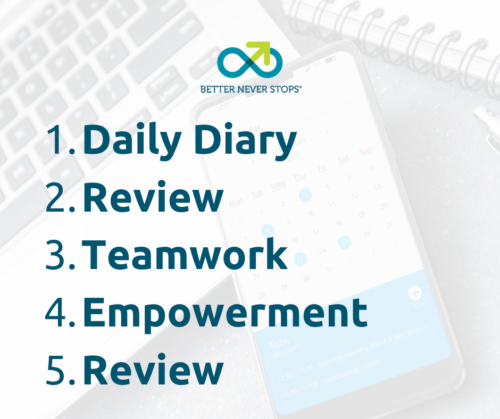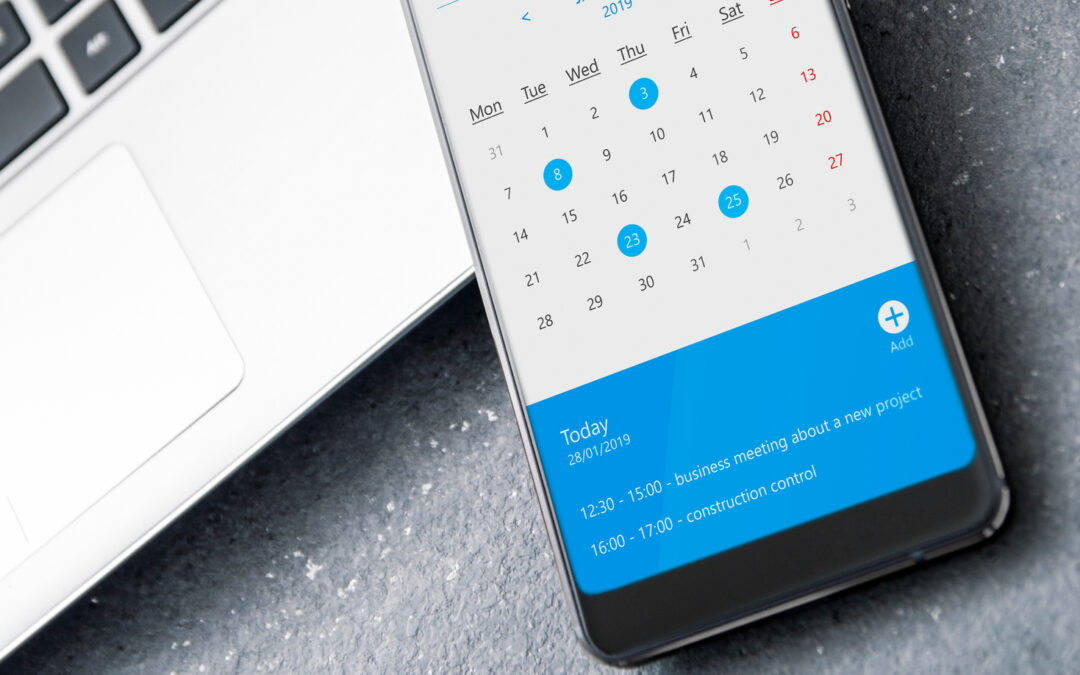But when you do, and we’ll explain how in this article, you will find your business will start moving to the next level and you will get closer to that lifestyle you dreamed of when you set out at the very beginning.
What are the common issues entrepreneurs face?
In this article, we’ll be looking at the reasons you get trapped in your business and why time is such a difficult commodity to manage. It often tends to be the greatest challenge and frustration of business owners. Then we’ll share with you how to gain back those 25 working days a year.
What’s stopping you?
You want to own stuff and do stuff. This is your baby. The second trait is that of a perfectionist. You always strive to make things perfect and more you try and achieve this impossible task, the more frustrated you get.
These two traits work against you when you are trying to grow your business. What you need to do is empower other people in your business, let go more and accept that not everything will be perfect. If you do this, you will get stuff done and the business will grow.
When you started out, you did it all, but the business has moved on and so must you. Remember, if your business is stuck, nothing will change if nothing changes.
So, how can you change? What is the solution?
One of the analogies that I share in my book ‘How to fall back in love with your business’ is that you need to start thinking and behaving like the conductor of an orchestra. The conductor will set the music, manage the pace, and direct the experienced individuals who in turn will each play their part to achieve the final piece.
The conductor understands that they can’t do everything, but the success of the music comes from their direction. Similarly, a football manager will co-ordinate their team to get the best player in the right position. The manager is probably skilled enough to step in for a player, but without the top-level direction and oversight, would the team perform as well? Having the oversight of the big picture, managing the strategy and allowing the individual players to focus on optimising the part they play, is what will result in success.
When you take on the conductor or football manager type role, it will allow you to see how your team members are working. In businesses there are sometimes certain team members who are underutilized. They are talented and capable but have not been empowered to help you drive the business forward. Another issue which can be a killer for efficiency is poor teamwork or collaboration. The individuals may get on well in the working environment, but the mentality of helping each other beyond their own remit isn’t part of the company culture, and so they just focus on their own individual responsibilities rather that all working together towards the bigger goal. One question to consider is whether everyone is even clear on what the bigger goal is?
When you step back, it is much easier to see and address these types of issues. To do this, you need more time, so how can you get that?
5 steps to gain 25 working days per year

Here is the 5-step process
1. Daily Diary
Keep a daily diary of all the activities that you’re doing. Make a note of the tasks you do, ideally hourly but at least two or three times a day – set an alarm on your phone to remind you.
Here is a free template sheet you can use
The diary needs to include the date and time, a brief description of the task, why was it important and the time it took. The fifth column is for ‘Me/Else/No’ which we will come to in step 2. You might want to add additional notes like how you felt during the task and your energy levels at the time.
There are many benefits of this exercise, but one of the key things is to identify how you are using those power hours during a day to get your most productive work done. Power hours are different for different people. Some people get their best work done in the mornings, whereas for others the evening is their most productive.
You need to do this exercise for one month.
2. Review
Once you have completed the diary, you need to review it and consider whether you really needed to do the task? This is where you fill in the column ‘Me/Else/No’.
For each task consider, did you even need to do that task at all? With hindsight did it make a difference? If not, then put ‘No’. If it was important that the task was done, were you really the only person who could have done it? If so put ‘Me’ against the task in that column. Could someone else have done that task for you? Could you ask or teach someone else to do it? If so, put ‘Else’ or even better put the initials of the person who could do it. Do the same initials keep appearing?
3. Teamwork
Now is the time to sit down with your team, show them how you spend your time and share out the tasks which they can do. You might be surprised how good this will be for your team.
4. Empowerment
Your team will probably have wanted to get their hands on some of these tasks for ages, and now you are letting go, you will give them the opportunity to explore ideas and take responsibility. However, it’s really important to let them learn and make their own mistakes.
5. Review
Run this for a month, keep talking to the team, keep checking in with them about what they’re doing, how they’re getting on with the task you’re setting and then review it. Then do the diary exercise again the next quarter and the next, you will see that you are freeing up those days. And if small, unnecessary tasks are creeping in again you can keep on top of it and delegate them.
How do I gain the 25 days?
A very simple equation. If you were to gain an hour a day, every working day, that’s five hours a week, you do that for 50 weeks per year. That’s 250 working hours that you’ve gained, divide that by 10 hours per working day, and then translates into 25 working days.
The more time you save the more hours you get back. We are here to help you. We have a selection of free resources on our website, plus we offer 1-2-1 business advice programmes to support you through the changes you need to make to take your business to the next level. Contact me for a free discovery call.
Free resources
- The diary sheet mentioned in this article plus a whole range of other free tools are available from our website betterneverstops.global
- Get a free paperback copy of my book ‘How to fall in love with your business’ just pay £4.75 p&p
- Watch Love your Business TV and listen to our Podcast for business advice
Making an Impact
Did you know that every time watch Love your Business TV or listen to one of our podcasts, we then use that good to go and inspire ambitious people to live extraordinary lives?
As part of the Buy 1 Give 1 (B1G1) business giving movement, we have enabled 676 literacy and business days to be trained for entrepreneurial ladies in Uganda. So we really thank you for that. That’s on behalf of them and from us and everything that you do when you do good for me, I do good somewhere else in the world. We can make a difference in this world and we are a business for good.
Want to check the cash health of your business and understand how to improve?
Our free financial assessment takes just 4 minutes and provides you with a tailored report of expert advice on how to improve the cashflow within your business.
Visit www.betterneverstops.global/cashreview
Remember you can catch the full interview with Richard Mason
on YouTube at LoveYourBusiness.TV or on our
Better Never Stops Facebook page Facebook.com/BNSLiveYourDream/
Subscribe to LoveYourBusiness.TV on YouTube to see more helpful videos
Other articles you may be interested in…
Would you like between £1,000 & £5,000 to spend on growing your business?
The UK Government is providing over £20m to support the growth of small businesses. The support will be fully funded by the Government with no obligation for businesses to contribute financially. Grant-Funded Business Growth Package The grant will fund business...
3 ways to make your business slicker
Do you want your business to become slicker and more efficient? Are you looking for ways to get more from less? In this article we look at what industry disruptors have done to shake up their sectors and grow rapidly, and what you can practically do to help you...
Become more energetic, enthusiastic and healthier – A businessman’s guide
Does it feel like your brain just runs out of energy and crashes at around 3:00 PM? Are you starting to wince every time you look in the mirror? Has your get up and go, got up and left? Health and Fitness expert Ashley Bishop shares his advice on how to gain...
Now Your Business Can Become A Real Force For Good…
When you’re part of B1G1, you bring new purpose, meaning and relevance in your business by embedding giving right at the core of what you do. We’re here to help you make a real difference in our world AND in your business. Together.
To find more about B1G1, go to www.b1g1.com












